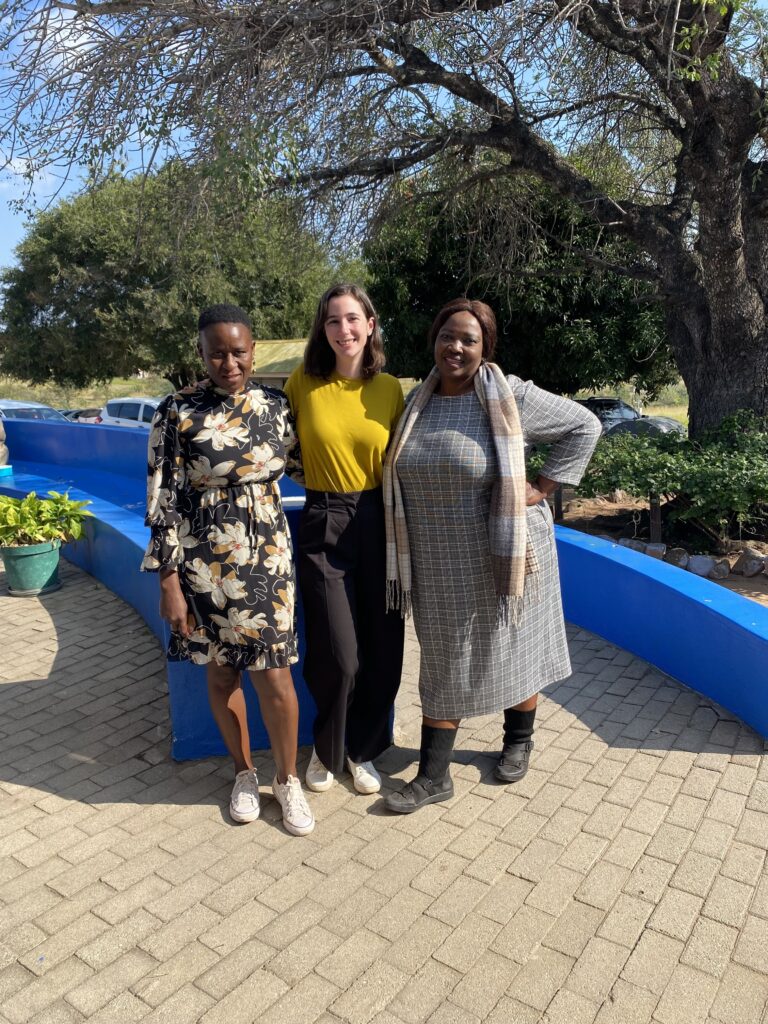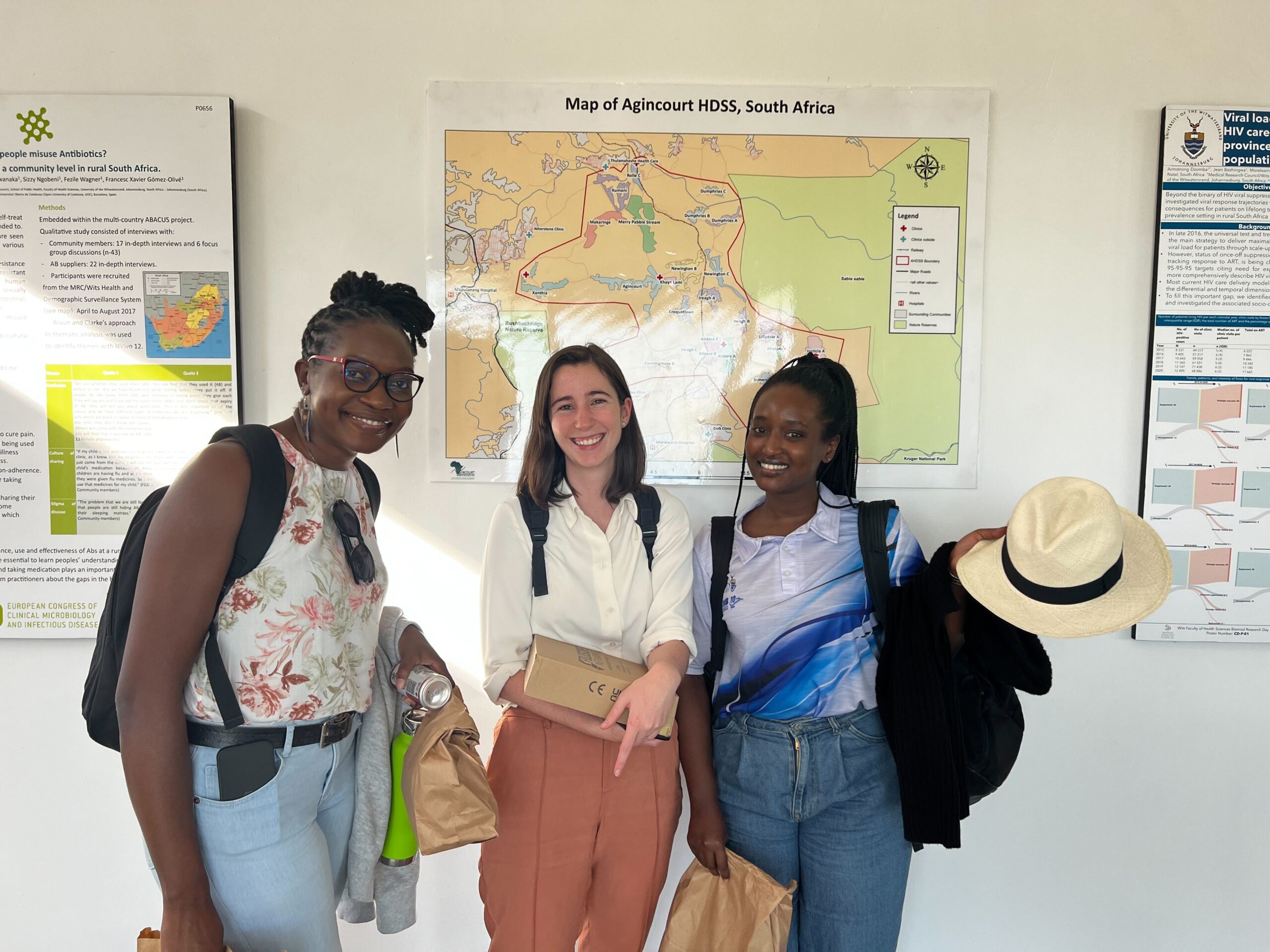Published: 07/24/2024
By Jamie Hansen, global health communications manager, and Violet Won Glickman, student communications assistant
In a collaboration between Stanford University and South African researchers, a transformative study of the gut microbiome within the African continent is unfolding. The innovative AWI-Gen 2 Microbiome Project is advancing scientific knowledge while also fostering a new generation of global health researchers committed to community engagement.
Filling an important research gap
Scientists increasingly recognize the close connections between the microbes in our gut and our immune, heart, and brain health. Population studies provide crucial understanding of how genetics, geography, lifestyle, and environment impact the microbiome, and therefore, our health, researchers say. However, communities from low- and middle-income countries, which represent the majority of the world’s population, have been largely excluded from large-scale microbiome research.
Now, scientists with the AWI-Gen 2 Microbiome Project have set out to fill this important knowledge gap. This project is studying the gut microbiome of 1,800 women from Burkina Faso, Ghana, Kenya, and South Africa, who live in a mix of rural, urban, and transitioning communities. It’s the largest population-representative survey of the gut microbiome of African individuals to date.
Already, they have uncovered 1,005 new bacterial genomes and discovered important new relationships between HIV infections and changes in the gut microbiome.
The project builds on the work of the H3Africa AWI-Gen Collaborative Centre, an initiative launched by a partnership between the INDEPTH health and demographic surveillance consortium and the University of the Witwatersrand (Wits). AWI-Gen, led by Michèle Ramsay, Director of the Wits’s Sydney Brenner Institute for Molecular Bioscience, studies how changing genomic factors, combined with health trends, impact cardiometabolic health in African populations.
“Putting the African Microbiome on the Map”
When Ami S. Bhatt, MD, PhD, global health core leader and Stanford Associate Professor of Medicine (Hematology) and of Genetics, joined Stanford in 2014 and was introduced to the AWI-Gen effort through the Stanford Center for Innovation in Global Health, she was excited by the consortium’s novel approach.
Bhatt described it as “a souped-up version of the census” where researchers collect information about who’s living where and with whom, along with detailed health information, to better understand the relationship between lifestyle and health over time.
She wondered if the microbiome could help shed new light on the collaborative’s work. In 2015, she received a Stanford Global Health Seed Grant to study this question in partnership with Scott Hazelhurst, PhD, a professor of electrical and information engineering at the University of the Witwatersrand in Johannesburg, South Africa. Since then, they’ve built a team of early-career global health researchers who have helped pilot and expand the study.
This study highlights the importance of understanding genetic and microbiome diversity across the African population for better health outcomes.
Luicer Olubayo, PhD, a postdoctoral fellow hosted at Sydney Brenner Institute of Molecular Biosciences, University of Witwatersrand
“This study highlights the importance of understanding genetic and microbiome diversity across the African population for better health outcomes,” said Luicer Olubayo, PhD, a postdoctoral fellow hosted at Sydney Brenner Institute of Molecular Biosciences, University of Witwatersrand, and contributor to the study. While many health studies follow large populations throughout life, collecting genomic and microbial data, most are carried out in well-resourced places. “I think this study will put the African microbiome on the map,” she said.
Bhatt added, “Population studies housed in Africa have sought to understand where modern humans come from. However, they are also important in answering questions related to current health issues in these populations. That’s what we came together to do.”
Microbiome studies focusing on low- and middle-income countries tend to compare data from rural, resource-limited settings in Africa with high-income populations in industrialized regions, said Stanford postdoctoral fellow and research collaborator Dylan Maghini, PhD. This approach limits comparisons to two extremes of lifestyle and resource access.
The AWI-Gen project, by sampling from six different communities across four African countries, offers a more diverse profile of lifestyles, environments, and associated diseases. This approach is discovering microbes unique to African populations that were absent in wealthier, high-density areas and provides the team with more nuanced insights beyond conventional comparisons.
Another critical aspect of the research involves understanding the gut microbiome’s association with HIV and other infectious diseases. Olubayo highlighted the project’s importance in identifying unique microbial signatures in HIV-positive populations. This work could eventually help lead to new HIV treatments related to the microbiome, she said. In the future, researchers may use the study platform to investigate connections between the gut microbiome and a wide range of infectious and chronic illnesses.
A new generation of global health researchers
For senior researchers Bhatt and Hazelhurst, developing a generation of thoughtful global health researchers has been as important as the study findings.
By far, the most important thing that we’re producing is very well-trained, globally-minded, and sophisticated scientists.
Ami S. Bhatt, MD, PhD, global health core leader and Stanford Associate Professor of Medicine (Hematology) and of Genetics
“By far, the most important thing that we’re producing is very well-trained, globally-minded, and sophisticated scientists,” said Bhatt.
Maghini is among the many trainees whose participation has shaped her approach to global health. She first joined the effort in 2019 as a graduate student in genetics, drawn to it because she could use a specific genomic sequencing technique that interested her.
She was quickly impressed by the thoughtful approach the international collaborators applied to every phase of the research. She has remained involved ever since and now, as a postdoctoral NIH/Fogarty Global Health Equity Scholar based in South Africa, she’s helping lead the study.
“It’s been such an excellent experience for personal growth and learning,” she said, adding, “It involves always being very intentional in how we think about what populations we study, how we recruit participants, how we’re contributing, working together, bringing on trainees, and engaging the community in this work.”
Research designed to benefit participants

In an effort to contribute meaningfully to the communities being studied, the project goes beyond traditional microbiome research and prioritizes sharing research findings with study participants.
The AWI-Gen Collaborative already differed from many studies by making it common practice to share with participants data related to blood pressure, HIV tests and other results important for follow-up care. Now, after hearing from collaborators and public engagement officers how the communities value all health-related findings, researchers are making a concerted effort to share a wider range of information with participants.
In May, Maghini and colleagues traveled to Agincourt, South Africa, to share results with the community they’d studied. They recruited and trained field workers in microbiome education and prepared individual reports for each participant. They shared the reports in home visits and community meetings to increase knowledge surrounding microbiome health.
The team reported that participants were curious about how their gut bacteria related to their health, prompting discussions about diet and general health. They also emphasized that this type of post-engagement makes participants more open to engaging in future studies.
“They have a right to know and a strong curiosity about the findings,” said Maghini.
This commitment to community-centered research is echoed by Ovokeraye Oduaran, PhD, a former postdoctoral fellow working with Hazelhurst. Oduaran also participated as a Global Health Equity Scholar and remains a key collaborator.
“This project shaped my outlook on how research collaborations should be conducted and engaging communities in the right way. With this approach, there’s no limitation to how far the work can go,” she said.
Cover photo caption: Members of the AWI-Gen microbiome research team on a field visit to the Agincourt Health and Demographic Surveillance System in South Africa. Left to right: Luicer Olubayo, Dylan Maghini, Claudine Nkera-Gutabara.

